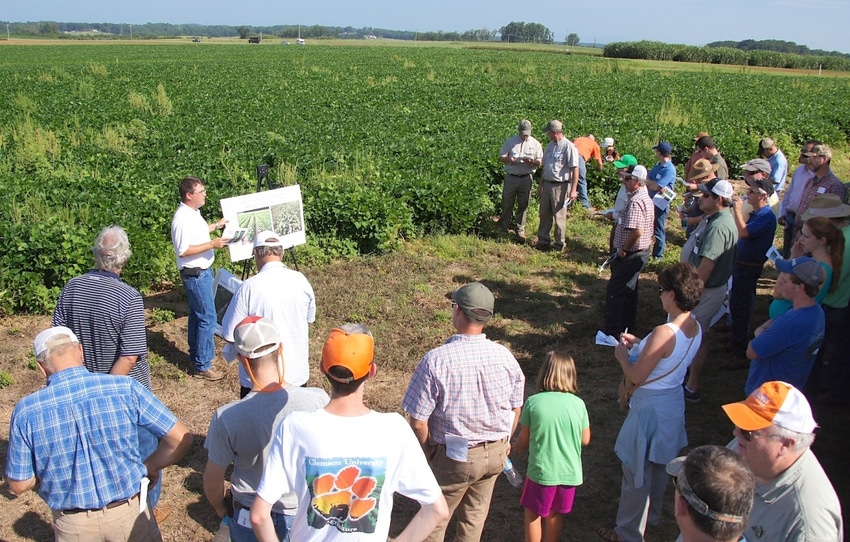August 28, 2014

On a day that’s a hundred degrees in the shade, you might think it hard to find something good to say about the weather. Not so as nearly 300 farmers gathered in the August sunshine to get the latest updates from research and Extension specialists at Clemson University’s Simpson Experiment Station field day, where the weather, in fact, received due appreciation from experts on South Carolina crops.
The annual field day held on Saturday, Aug. 23 this year showcases Clemson research and teaches farmers the latest practices in crop and forage production, animal science and other agricultural enterprises.
“Insects in general were pretty light this year in soybeans and it was probably because of the winter,” said Clemson Extension entomologist Jeremy Greene. “Cold and wet is not good for insects. We had a bad ice storm in the middle of the state this winter that did us some favors.”
As a result, he said, “kudzu bugs were pretty much a no-show this year,” cautiously adding that “we’re not out of the woods yet.” Along with fewer insects, fewer diseases have stressed major crops this year, plant pathologist John Mueller told farmers gathered before a research plot of soybeans.
“August is usually rust month, but there’s not much of it this year,” Mueller said, adding that the disease typically would be sweeping through Georgia by this time of year but instead has been found only in patches in Florida and Alabama.
“My advice is to save your money on the fungicide spray, but if this hurricane changes course and sits over South Carolina for a couple of weeks, you can call me the dumbest plant pathologist around.”
Clemson experts shared results from the latest research results to help farmers take advantage of new opportunities — including new developments in old crops like grain sorghum.
“It’s a tough old crop that has been around for years,” said David Gunter, a Clemson Extension feed grain specialist. “It’s a good crop for the state given our hot and sometimes dry weather.”
Clemson geneticist and plant breeder Stephen Kresovich told the group that South Carolina is well-positioned to take advantage of trends in American sorghum production.
“The grain sorghum industry is based now in the high plains, but they don’t have enough water. The industry is going to move east, so it’s a great opportunity here,” said Kresovich, who leads the university’s Advanced Plant Technology (APT) program.
“Clemson is trying to take advantage of where the science is going and steer it into the crop. We building the capabilities to help the plant breeders incorporate the traits they want into crop.”
Beyond the fields, a grateful group of horse owners clustered inside the cooling shade of a barn at attend to a short course on horse health and nutrition. Equine program leader Kristine Vernon, livestock Extension specialist Cassie Wycoff and Clemson horse barn manager Rebecca Shirely handed out brochures, business cards and one-pagers on forage and feed and how to tell when the horse has packed on a few too many pounds.
The group also learned about “TPR” — temperature, pulse and respiration — and the power of observation.
“I teach our students to give our horses a good look every day,” Shirley said. “Check appetite, cuts and bruises, hooves and shoes. Eye problems need tending right away. Eye injuries go bad fast.”
Horses, along with pond management, sheep, bees and and4-H programs were added to the mix this year for the Simpson station showcase.
“The knowledge that comes from the research projects here is designed to be used directly by producers across South Carolina,” said station manager Garland Veasey. “It’s not often that farmers in the Upstate have the chance to talk directly with our row-crop specialists who are stationed around the state. This is a good chance to one-on-one interaction between farmers and scientists.”
About the Author(s)
You May Also Like




